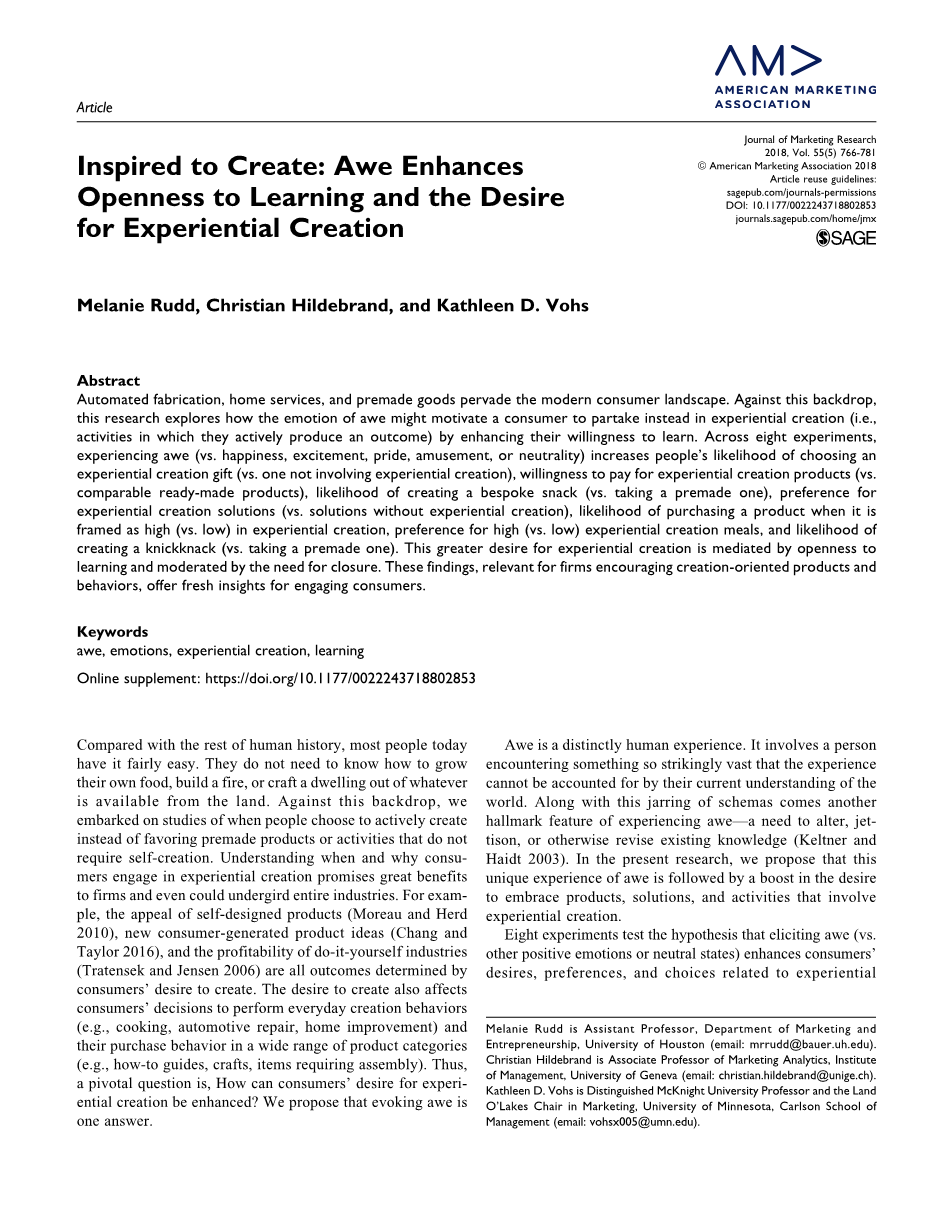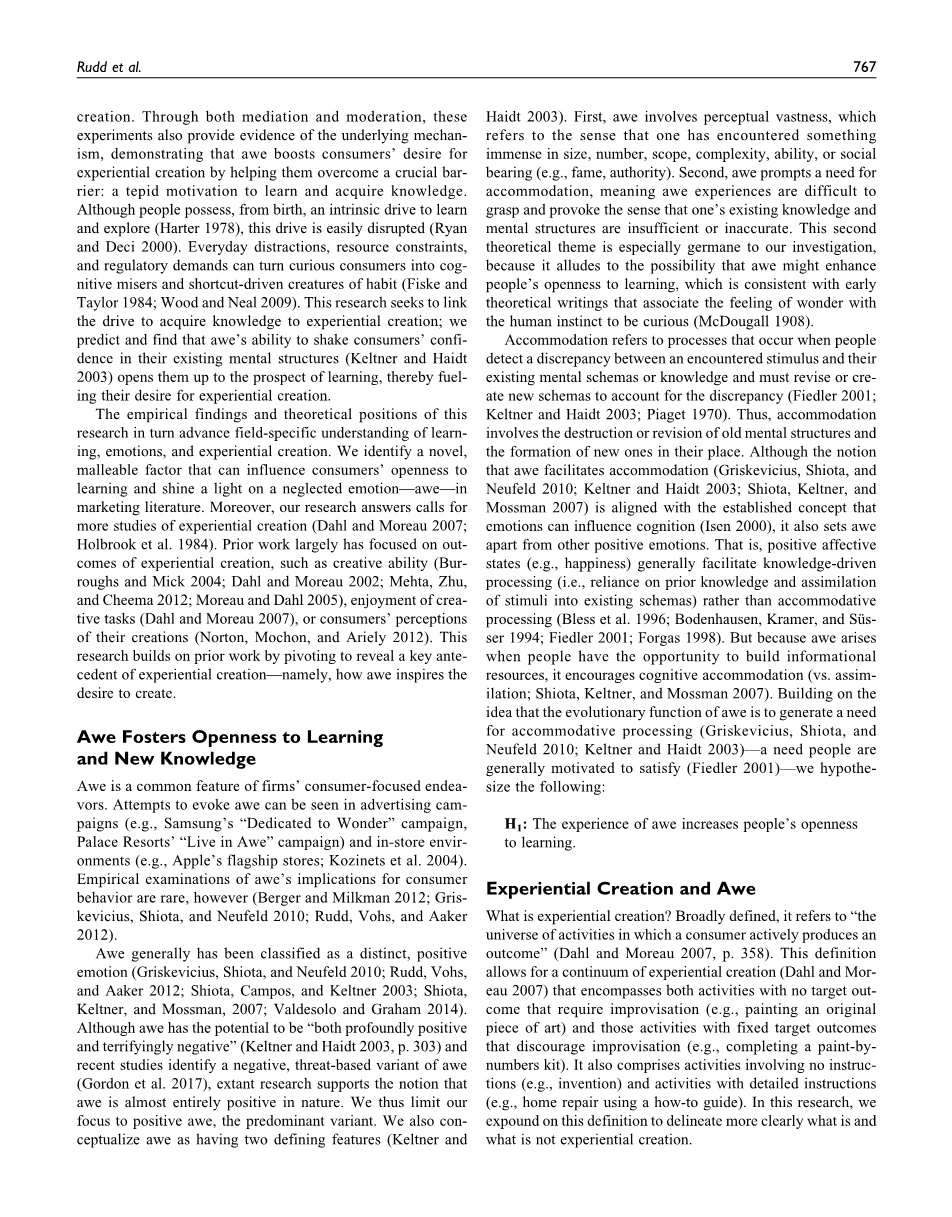

英语原文共 17 页,剩余内容已隐藏,支付完成后下载完整资料
激发创造:敬畏增强学习的开放性和体验创造的欲望
Inspired to Create: Awe Enhances Openness to Learning and the Desire for Experiential Creation
Automated fabrication, home services, and premade goods pervade the modern consumer landscape. Against this backdrop, this research explores how the emotion of awe might motivate a consumer to partake instead in experiential creation (i.e., activities in which they actively produce an outcome) by enhancing their willingness to learn. Across eight experiments, experiencing awe (vs. happiness, excitement, pride, amusement, or neutrality) increases peoplersquo;s likelihood of choosing an experiential creation gift (vs. one not involving experiential creation), willingness to pay for experiential creation products (vs. comparable ready-made products), likelihood of creating a bespoke snack (vs. taking a premade one), preference for experiential creation solutions (vs. solutions without experiential creation), likelihood of purchasing a product when it is framed as high (vs. low) in experiential creation, preference for high (vs. low) experiential creation meals, and likelihood of creating a knickknack (vs. taking a premade one). This greater desire for experiential creation is mediated by openness to learning and moderated by the need for closure. These findings, relevant for firms encouraging creation-oriented products and behaviors, offer fresh insights for engaging consumers.
自动化制造、家庭服务和预制产品遍布现代消费景观。在此背景下,本研究探究了敬畏情绪如何通过增强消费者的学习意愿激励消费者参与体验性创造(即,他们积极产生结果的活动)。通过八个实验,实验敬畏(与快乐、兴奋、骄傲、娱乐或中立)增加了人们选择体验性创作礼物(与不涉及体验性创作的礼物)的可能性,愿意为体验性创作产品付费(与现成的产品相比),偏好制作定制零食(与采用预制零食相比),偏好体验性创造解决方案(相对于没有体验性创造的解决方案),当产品在体验性创造中被定位为高(相对于低)时购买产品的可能性,喜欢高(对低)体验的创作餐,以及创造小摆设的可能性(对采取预先准备的)。。这种对体验性创造的更大渴望是通过对学习的开放来调节的,并且由对封闭的需要调节。
Keywords
awe, emotions, experiential creation, learning
敬畏、情感、体验创造、学习
Compared with the rest of human history, most people today have it fairly easy. They do not need to know how to grow their own food, build a fire, or craft a dwelling out of whatever is available from the land. Against this backdrop, we embarked on studies of when people choose to actively create instead of favoring premade products or activities that do not require self-creation. Understanding when and why consumers engage in experiential creation promises great benefits to firms and even could undergird entire industries. For example, the appeal of self-designed products (Moreau and Herd 2010), new consumer-generated product ideas (Chang and Taylor 2016), and the profitability of do-it-yourself industries (Tratensek and Jensen 2006) are all outcomes determined by consumersrsquo; desire to create. The desire to create also affects consumersrsquo; decisions to perform everyday creation behaviors (e.g., cooking, automotive repair, home improvement) and their purchase behavior in a wide range of product categories (e.g., how-to guides, crafts, items requiring assembly). Thus, a pivotal question is, How can consumersrsquo; desire for experiential creation be enhanced? We propose that evoking awe is one answer.
与历史上的其他人相比,今天的大多数人都相当容易。他们不需要知道如何种植自己的食物,如何生火,如何用土地上的任何东西建造房屋。在这种背景下,我们开始研究人们何时选择积极创造,而不是偏爱不需要自我创造的高级产品或活动。了解消费者何时以及为什么从事体验性创造,会给企业带来巨大的好处,甚至可能支撑整个行业。例如,自主设计的产品的吸引力(Moreau and Herd 2010)、消费者创造的新产品理念(Chang and Taylor 2016)、自己动手的行业的盈利能力(Tratensek and Jensen 2006)都是由消费者创造的欲望决定的结果。创造的愿望还影响消费者决定执行日常创造行为(例如,烹饪、汽车修理、家庭装修)以及他们在广泛的产品类别(例如,操作指南、工艺品、需要组装的物品)中的购买行为。因此,一个关键的问题是,消费者对体验创造的欲望如何得到增强?我们认为唤起敬畏是一个答案。
Awe is a distinctly human experience. It involves a person encountering something so strikingly vast that the experience cannot be accounted for by their current understanding of the world. Along with this jarring of schemas comes another hallmark feature of experiencing awe—a need to alter, jettison, or otherwise revise existing knowledge (Keltner and Haidt 2003). In the present research, we propose that this unique experience of awe is followed by a boost in the desire to embrace products, solutions, and activities that involve experiential creation.
敬畏是人类特有的体验。它涉及一个人遇到如此巨大的东西,以至于他们目前对世界的理解无法解释这种经历。伴随着这种模式冲击而来的是体验敬畏的另一个标志性特征——需要改变、放弃或以其他方式修改现有知识(Keltner和Haidt 2003)。在当前的研究中,我们建议这种独特的敬畏体验之后会增强对包含体验性创造的产品、解决方案和活动的渴望。
Eight experiments test the hypothesis that eliciting awe (vs. other positive emotions or neutral states) enhances consumersrsquo; desires, preferences, and choices related to experiential creation. Through both mediation and moderation, these experiments also provide evidence of the underlying mechanism, demonstrating that awe boosts consumersrsquo; desire for experiential creation by helping them overcome a crucial barrier: a tepid motivation to learn and acquire knowledge. Although people possess, from birth, an intrinsic drive to learn and explore (Harter 1978), this drive is easily disrupted (Ryan and Deci 2000). Everyday distractions, resource constraints, and regulatory demands can turn curious consumers into cognitive misers and shortcut-driven creatures of habit (Fiske andTaylor 1984; Wood and Neal 2009). This research seeks to link the drive to acquire knowledge to experiential creation; we predict and find that awersquo;s ability to shake consumersrsquo; confidence in their existing mental structures (Keltner and Haidt 2003) opens them up to the prospect of learning, thereby fueling their desire for experiential creation.
八个实验检验了引发敬畏(相对于其他积极情绪或中立状态)增强消费者与体验创造相关的欲望、偏好和选择的假设。通过调节和抑制,这些实验还提供了潜在机制的证据,表明敬畏通过帮助消费者克服一个关键的障碍——学习和获取知识的温和动机——来增强他们对体验性创造的欲望。尽管人们从出生起就具有学习和探索的内在动力(哈特1978),但这种动力很容易被打断(赖安和德克2000)。每天的分心、资源限制和监管要求都可能把好奇的消费者变成认知上的吝啬鬼和习惯上的捷径驱动生物(Fiske andTaylor 1984;Wood and Neal 2009)。本研究试图将获取知识的动力与体验创造联系起来;我们预测并发现,威慑能力能够动摇消费者对现有心理结构的信心(Keltner和Haidt 2003)为他们打开了学习的前景,从而激发他们对体验的渴望。
The empirical findings and theoretical positions of this research in turn advance field-specific understanding of learning, emotions, and experiential creation. We identify a novel, malleable factor that can influence consumersrsquo; openness to learning and shine a light on a neglected
全文共106800字,剩余内容已隐藏,支付完成后下载完整资料
资料编号:[1518]


